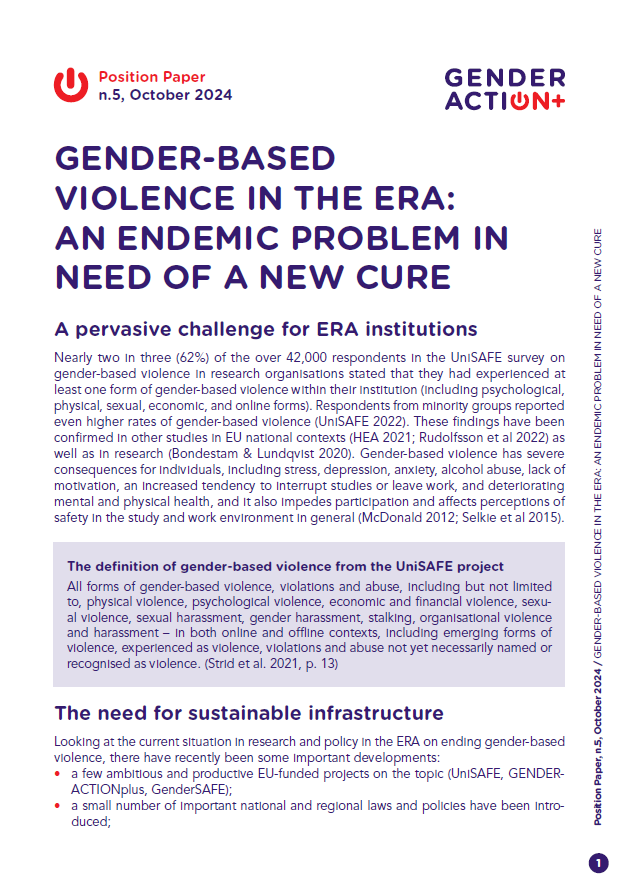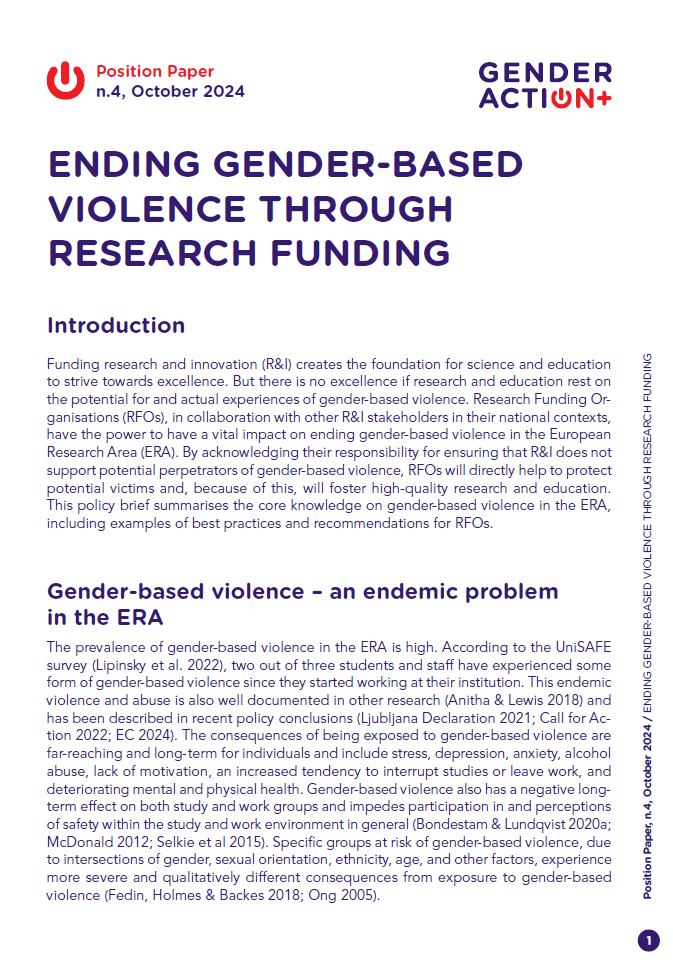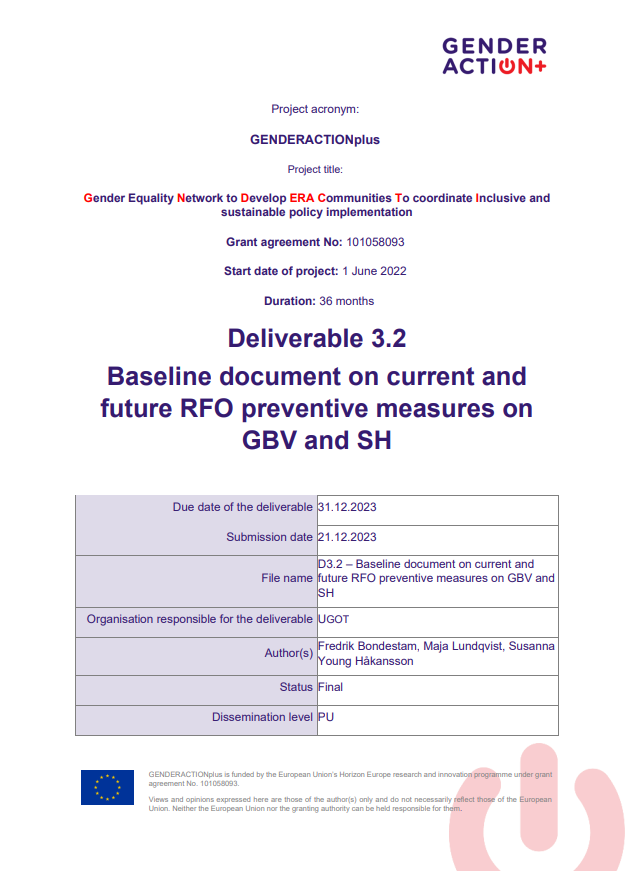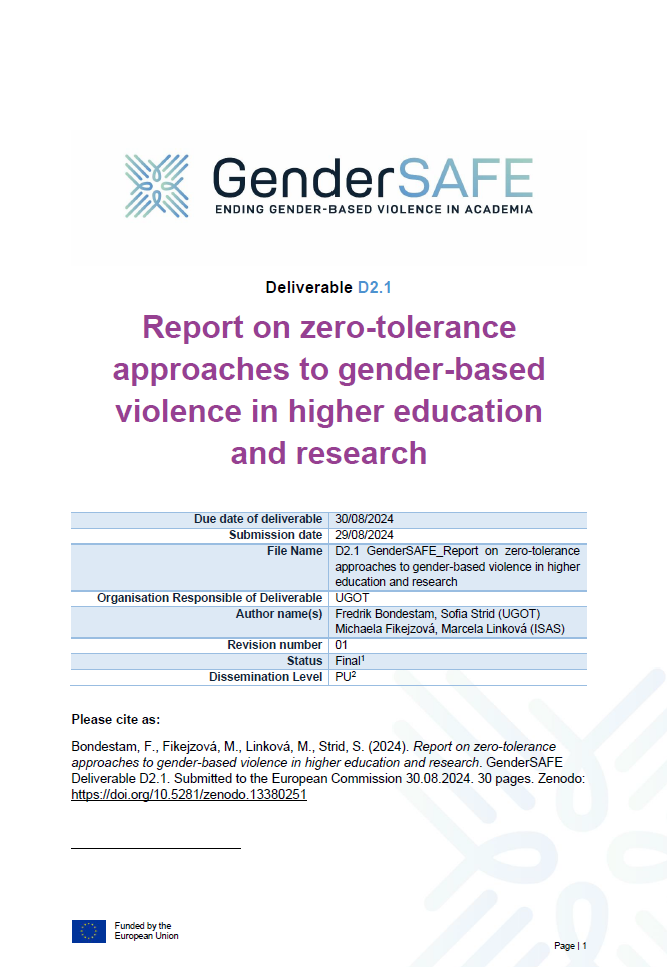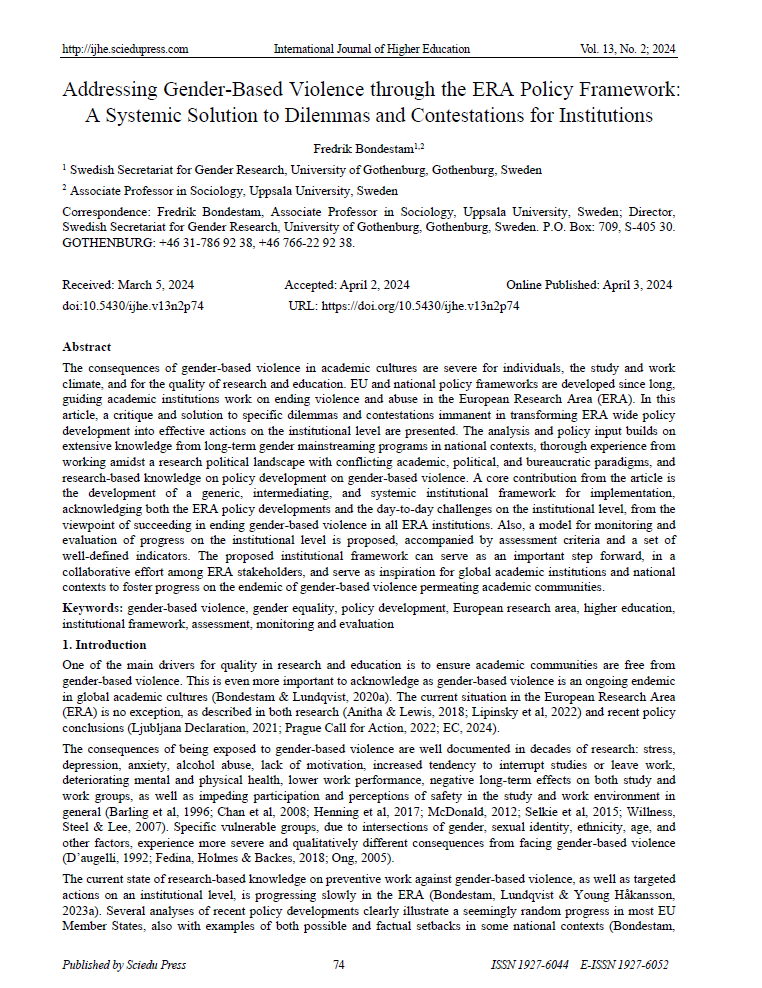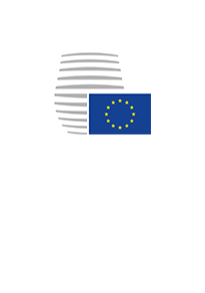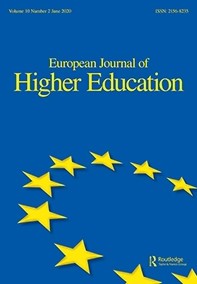Sexual harassment
In the past few years, the Swedish Secretariat for Gender Research has worked on a number of different projects related to sexual harassment in working life in general and in academia specifically.
#Metoo demonstrated with great clarity that sexual harassment is happening at in society, not the least at work, and the international research field points this out.
But the picture is more complex. We know that sexual harassment exists and that it has serious negative consequences at an individual, institutional and societal level. However, we know less about the the exposure to different forms of harassment, who the perpetrators are and perhaps, above all, how we can best prevent sexual harassment and other gender-based violence in our workplaces.
With many years of experience of working on questions concerning conditions in research and education, we have produced a number of research reviews and reports on the theme of sexual harassment, looking at Sweden, the Nordic countries and international experience. These are all collected under Publications here on our website. The knowledge gaps and needs identified in our commissioned work and projects give rise to new ideas for articles, which are developed and formulated by the secretariat. To play our part in developing the field of knowledge in the Nordic countries, the secretariat will publish review and method articles in the years ahead.
GenderSAFE
GenderSAFE focus on methods to counteract gender-based violence in academia.
Gender-based violence is an extensive problem in higher education and research in Sweden, the Nordic countries and internationally. That is why we participate in a project financed by the European Commission, in collaboration with researchers from several EU member states.The purpose is to contribute to the implementation of a strategy for zero tolerance against gender-based violence in higher education and research within the European Research Area (ERA).
Nordic anthology on sexual harassment
In recent years we have produced and compiled knowledge in the field that has shown the extent and complexity of the problem, and also pointed out needs for additional knowledge.
In order to continue to help address the problems of gender-based victimisation, we have produced a Nordic anthology, to broaden knowledge about sexual harassment and to position the issue in a wider context. The book is initiated, edited and funded by the Swedish Secretariat for Gender Research and NIKK, Nordic Information on Gender, as part of both organisations' work to produce and disseminate knowledge on sexual harassment, nationally, in the Nordic region and internationally.
This work was conducted in cooperation with NIKK, Nordic Information on Gender, a collaborative body subordinate to the Nordic Council of Ministers, placed at the Swedish Secretariat for Gender Research.
The anthology was published in April 2023.
GENDERACTIONplus
Gender-based violence and harassment resides throughout the European Research Area, ERA. Two out of three students and staff have experienced some form of gender-based violence, according to recent research. The consequences are severe for individuals, groups, institutions, and not the least for the quality of research and education.
Therefore, developing measures and strategies eradicating gender-based violence is a main priority for the European Research Area, and a pertinent focus in the GENDERACTIONplus project.
Within the framework of the project the Swedish Secretariat for Gender Research will coordinate policy development on gender-based violence and harassment in the European Research Area. This is done through collecting relevant research and analysing policy in EU Member States.
We collect and analyse useful preventive measures for research funding organisations, and also enhance commitment on a national level by developing a template for a zero-tolerance policy on gender-based violence and harassment. Several planned activities include for example mutual learning exercises for communities of practice in GENDERACTIONplus, as well as targeted workshops strengthening citizen engagement.
UniSAFE
Despite the scale, the political significance and the growing interest in academia, gender-based violence in research organisations remains largely under-reported and under-researched. Without sufficient knowledge, infrastructure, measures, and activities in place in academia, it is difficult to fully prevent, protect or even prosecute.
UniSAFE is an EU-funded project that aims to produce better knowledge on gender-based violence (GBV) and sexual harassment (SH) in research performing organisations, and to translate this knowledge into operational tools for higher education, research organisations and policymakers.
Over three years, UniSAFE will provide up-to-date, robust and reliable quantitative and qualitative data on GBV and SH, including newly emerging forms of violence, in universities and research performing organisations.
SUPPORTER
Higher education in sport and sport institutions is characterised by unequal conditions and widespread issues of gender-based vulnerability, racism and homophobia. SUPPORTER (Securing Sports Education Through Innovative and Inclusive Gender Equality Plans) is an EU project funded under Horizon-Widera 2022 that aims to contribute to more inclusive gender equality in the European Research Area (ERA) through a focus on sports education.
The project supports eight institutions in their efforts to develop intersectional, inclusive and impactful gender equality plans, tailored to sports colleges and universities. Building on subject matter expertise and research-based approaches to knowledge exchange and training, the project creates a programme of capacity building and mutual learning.
Nordic Reserach Funding Initiative in Sexual Harassment at Work
Violence, harassment and other forms of vulnerability in the workplace are major societal challenges with serious consequences for individuals and workplace organisations.
There are major gaps in our knowledge about methods for preventing and stopping violence and harassment, protecting victims and being proactive in workplace environments. Research and evidence-based knowledge is essential to be able to develop new and effective measures to combat sexual harassment in the workplace.
With this background, the Nordic Council of Ministers has decided on a cross-sectoral research initiative jointly with several sectors within the Nordic cooperation. These collaborative sectors are gender equality, culture, working life and the Nordic Committee for Children and Young People.
Spanning 2021-2023, NIKK, Nordic Information on Gender, is administering a research initiative on sexual harassment in the workplace on behalf of the Nordic Council of Ministers. NIKK is a cooperation body under the Council of Ministers, placed at the Swedish Secretariat for Gender Research.
Read more about the research initiative
Some of our earlier projects
Research study on sexual harassment in academia
The Swedish Secretariat for Gender Research is working with a national research study as part of the Research and cooperation programme to combat sexual harassment and gender-based violence. The study will investigate the occurrence, scope and consequences of sexual harassment in academia in Sweden. The survey was sent out in May 2021 and reached a representative sample of employees and students at universities and higher education institutions in Sweden. The study was the first of its kind and seeks to provide data for more effective work to combat sexual harassment in academia.
The ambition of the prevalence study is to gain a better picture of why sexual harassment occurs, who the victims are, who the perpetrators are, the different forms that harassment victimisation takes, where it occurs, how long it lasts and what the consequences are for the victims, for the perpetrators, for working groups and for the work and study environment itself. The survey is designed to capture the diversity of exposure of harassment, identify links to different grounds for discrimination, distinguish between different forms of harassment, and examine exposure of harassment over time, severity, and structural conditions.
The material gathered will enable more in-depth part-studies and new research questions in the field. The study has been ethically reviewed and accredited by the Swedish Ethical Review Authority and the confidentiality of respondents is of the utmost priority.
Research review on work to prevent sexual harassment in Swedish and Nordic working life
For Kantar Sifo, the Swedish Secretariat for Gender Research has produced a research overview on work to prevent sexual harassment in Swedish and Nordic working life. The research overview builds on a systematic literature search across ten databases in Sweden and the other Nordic countries plus supplementary targeted searches. The material used as the basis for the review comprises academic publications in the form of articles and reports. It also includes a certain amount of research on education and working life in North America. One of the main results highlighted by the research review is that research into work to prevent (the occurrence and the consequences of) sexual harassment in the workplace in Sweden and the Nordic countries is an almost non-existent field of research. The report was published in 2020.
Survey and report on sexual harassment in academia in the EU
The Secretariat was commissioned by the EU’s Standing Working Group on Gender and Research in Innovation to produce a survey of activities, measures and strategies at national level in member states. The purpose of the survey was to obtain research-based data which can be used to combat sexual harassment in academia. The survey Sexual Harassment in the Research and Higher Education Sector: National Policies and Measures in EU Member States and Associated Countries shows that the question of sexual harassment, with a few exceptions, is an unexamined problem at national level in Europe. There are major differences between countries and in general there is a lack of cohesive efforts, and the level of knowledge and existing research is low.
Increasing Nordic knowledge on sexual harassment in working life
Violence, harassment and other forms of vulnerability in the workplace are major societal challenges with serious consequences for individuals and workplace organisations. But there are major gaps in our knowledge about methods for preventing and stopping violence and harassment, protecting victims and being proactive in workplace environments. Research and evidence-based knowledge is essential to be able to develop new and effective measures to combat sexual harassment in the workplace.
The Swedish Secretariat for Gender Research has conducted a research-based pilot study to identify knowledge gaps on sexual harassment in working life in the Nordic countries and to produce proposals for how these can be addressed. A Nordic research review is being produced: Sexually harassed at work.
Spanning 2021-2023, a research initiative on sexual harassment in the workplace is administered on behalf of the Nordic Council of Ministers. The initiative is especially focused on prevention and methods for intervention through industry studies and comparative studies of different industries. There will be two calls for research funding.
This work is conducted within the remit of NIKK, Nordic Information on Gender, a collaborative body subordinate to the Nordic Council of Ministers, placed at the Swedish Secretariat for Gender Research.
Publications on the subject
Rethinking Institutional Responses to Gender-Based Violence in Academia as Forms of Care in the Nordic Context
(link to publication)
Authors: Angelica Simonsson, Nicole Ovesen, Finnborg Salome Steinþórsdóttir, Liisa Husu (2024)
Publisher: Open Gender Journal
________________________________________________________
Re-imagining Sexual Harassment – Perspectives from the Nordic Region
(link to the publication at Policy Press)
Authors: Sumaya Jirde Ali, Silas Aliki, Hildur Fjóla Antonsdóttir, Elin Bjarnegård, Dolores Calvo, Paulina de los Reyes, Åsa Eldén, Anne Hellum, Anne Laure Humbert, Mads Ananda Lodahl, Silje Lundgren, Maja Lundqvist, Heta Mulari, Angelica Simonsson, Lea Skewes, Sigbjørn Skåden, Sofia Strid and Kajsa Widegren (2023)
Editors: Maja Lundqvist, Angelica Simonsson och Kajsa Widegren.
The book is available in bookstores and via the publisher Policy Press, an imprint of Bristol University Press, and OpenAcess.
